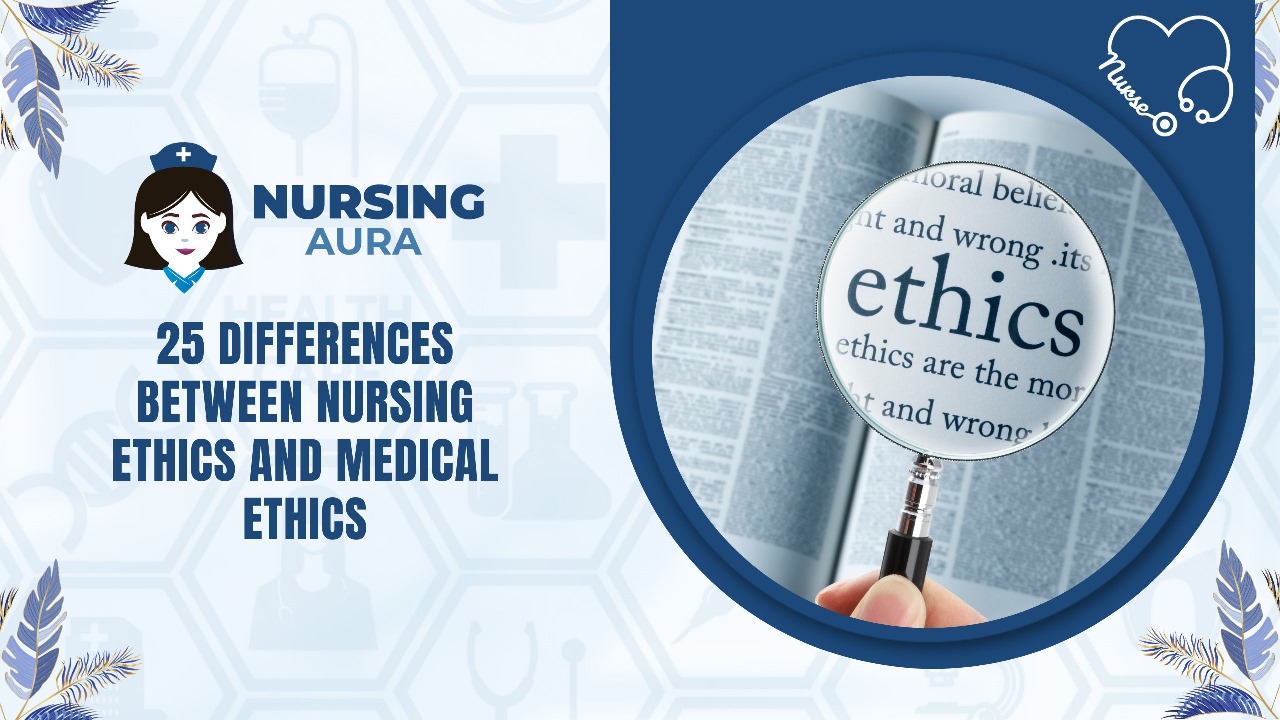Healthcare relies on nursing and medical ethics to offer safe, compassionate, and moral care. Both areas are based on beneficence, autonomy, and non-maleficence, but their focus, scope, and application differ. This post contrasts 25 Nursing Ethics and Medical Ethics examples to show how both areas address healthcare’s difficult moral challenges.
Nursing Ethics addresses nurses’ patient-related ethics. Empathy, trust, and patient advocacy are stressed in nurse-patient relationships. Medical Ethics addresses ethical challenges faced by doctors, researchers, and hospitals. While both areas are bound by standards of behavior, Nursing Ethics emphasizes the entire well-being of the patient, emphasizing comfort, dignity, and emotional support, which Medical Ethics may overlook.
The decision-making process is another difference. Nurses routinely make real-time patient welfare choices at the bedside. Thus, nursing ethics emphasizes timely ethical decisions and actions. Thus, ethical decision-making must be more deliberate and bureaucratic.
Additionally, their educational and professional backgrounds vary greatly. Specialized training emphasizes compassionate care and patient advocacy to assist nurses in addressing ethical issues. Physicians’ lengthy medical education includes ethics but focuses on clinical and diagnostic treatment. Nursing Ethics is frequently more feminine and caring, whereas Medical Ethics is more masculine and aloof, mirroring healthcare gender norms. These are only a handful of the many differences between Nursing Ethics and Medical Ethics in healthcare.
|
S.No. |
Aspects |
Nursing Ethics |
Medical Ethics |
|
1. |
Focus |
Patient care and well-being |
Diagnosis and treatment of diseases |
|
2. |
Scope |
Holistic care including emotional and social needs |
Diagnosis, treatment, and research on diseases |
|
3. |
Decision-making authority |
Collaborative with the patient and their family |
Often made by the medical practitioner |
|
4. |
Educational emphasis |
Compassionate care and communication skills |
Clinical knowledge and diagnostic expertise |
|
5. |
Code of conduct |
ANA Code of Ethics |
AMA Code of Medical Ethics |
|
6. |
Patient interaction |
Continual emotional support and empathy |
Focus on diagnosis, prognosis, and treatment plans |
|
7. |
Ethical dilemmas |
End-of-life care and patient autonomy |
Patient confidentiality and treatment disclosure |
|
8. |
Advocacy |
Patient rights and preferences |
Evidence-based treatments and best practices |
|
9. |
Informed consent |
Explanation of procedures in patient-friendly terms |
Detailed explanation of risks and benefits of treatment |
|
10. |
Professional approach |
Patient-centered care |
Disease-centered management |
|
11. |
Core principles |
Beneficence, non-maleficence, and autonomy |
Autonomy, justice, and beneficence |
|
12. |
Relationship building |
Trust and rapport building with patients |
Professionalism and clear communication with patients |
|
13. |
Care setting |
Primarily in hospitals, clinics, and homes |
Hospitals, clinics, research institutions |
|
14. |
Ethical guidelines |
Focused on the nurse-patient relationship |
Focused on the physician-patient relationship |
|
15. |
Moral responsibilities |
Providing comfort and emotional support |
Accurate diagnosis and effective treatment |
|
16. |
Decision-making process |
Patient’s preferences are considered primary |
Medical judgment and evidence-based practices |
|
17. |
Approach to technology |
Emphasis on human touch in care provision |
Emphasis on technology in diagnosis and treatment |
|
18. |
Legal implications |
Nurses can face legal consequences for negligence |
Doctors may face legal implications for malpractice |
|
19. |
Preventive measures |
Focus on promoting healthy lifestyles |
Focus on early diagnosis and preventive treatments |
|
20. |
Care continuity |
Long-term care management and emotional support |
Acute care management and treatment planning |
|
21. |
Role in interdisciplinary teams |
Provides a holistic perspective on patient care |
Contributes specialized medical knowledge to the team |
|
22. |
Boundaries with patients |
Emphasizes empathy and emotional support |
Emphasizes professionalism and maintaining boundaries |
|
23. |
Ethical training |
Focus on empathy and compassionate care |
Emphasis on medical decision-making and critical thinking |
|
24. |
Decision-making time frame |
Often immediate responses to patient needs |
May involve more extended deliberation and analysis |
|
25. |
Care coordination |
Collaborates closely with other healthcare professionals |
Leads the care team and treatment coordination |
Frequently Asked Questions (FAQs)
Q1. What makes Nursing Ethics different from Medical Ethics?
Nursing ethics highlights nurses’ patient-related ethics. Empathy, trust, and patient advocacy are fostered in nurse-patient interactions. Instead, medical ethics addresses physician, researcher, and healthcare institution ethics. Medical research, end-of-life decisions, and resource allocation are its issues.
Q2. How do ethical decision-making differ in nursing and medicine?
Healthcare nurses make quick ethical judgments to safeguard patients, making Nursing Ethics more on real-time decision-making. Instead, Medical Ethics necessitates a more systematic and bureaucratic approach to complex, long-term ethical dilemmas. Such as healthcare policy, research methodologies, and ethical judgments.
Q3. Are Nursing and Medical Ethics professionals' educational and professional backgrounds different?
Variations are obvious. Nurses get specialized training in compassionate care and patient advocacy to manage ethical issues in their field. Physicians undergo extensive ethics training but focus on clinical and diagnostic therapy. Due to schooling, their ethics may differ.
Q4. Do gender stereotypes affect Nursing and Medical Ethics?
Due to its history of compassion, empathy, and emotional support, nursing ethics tends to be more feminine and loving. In contrast, Medical Ethics takes a more masculine, detached perspective, reflecting healthcare gender norms. To have balanced ethical viewpoints in both disciplines, these preconceptions must be recognized and challenged.
Q5. Despite their differences, what is Nursing Ethics and Medical Ethics' goal?
Nursing and medical ethics aim to promote the greatest standards of care and morality in healthcare, notwithstanding their disparities. Despite their complexity, medical ethics prioritize patient care. Beneficience, autonomy, and non-maleficence improve patient and healthcare system ethics.

